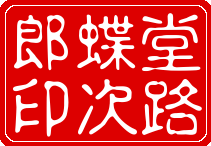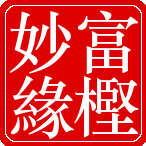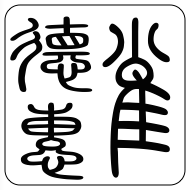Writing Rokugani Names in Kanji
緑岩人の苗字の書き方
(
Rokugan-jin no myōji no kakikata)
A while ago I posted a version of this list of family name kanji on the AEG forum, filled in mostly by me but with a lot of interesting discussion and input from other posters there. Most foolishly, I made updates right in the original post and didn't keep an offline copy, so the whole thing is stuck behind the Great Wall of Mystery/Apathy now. It took a while, but my annoyance at not having access to the list has eventually come to outweigh my annoyance at having to type it all out again, and I've reconstructed it as best I could from memory--fortunately a bit faster than creating it in the first place.
The original list was a work in progress, and that's definitely still true. Let me know if I've missed anything, or if you have any suggestions for more optimal renderings.
Disclaimers
- I'm not a native speaker of Japanese (and on a basic level my kanji reading is probably pretty inflected by Chinese).
- Rokugan Is Not Japan anyway, and using kanji probably isn't
entirely
canonical (sources differ). This is just for funsies.
- Please please don't use this to get a kanji tattoo ("don't get a kanji tattoo" is almost never not good advice, anyway).
So what is this good for?
I originally started working on it because I wanted to create "seal" graphics for RPG characters. (EDIT: see
this post downthread
for some tools for generating seals.) You can use names in kanji to sign in-character letters as gaming table props, decorate character sheets, make deck backers, in artwork, whatever. These days I sometimes even use name kanji as part of my brainstorming process when coming up with NPCs and the like.
But what about given (personal) names?
EDIT: see this post downthread for some more personal name resources.
In the original version of this post I was able to link to a bunch of threads on the AEG forum full of advice and inspiration for choosing given names for L5R characters. Alas, all fallen behind the veil of oblivion now. If you've got favorite resources, please share! I might try to dig up some links as I've got time/inclination later.
Once you have got a name, in general, as long as it is pronounceable in Japanese (that is, it would be possible to write it out in the
syllabic alphabet
), you'll be able to represent it with kanji one way or another, even if—like some of the names below—you end up with a purely phonetic transliteration.
Try taking your character name to
WWWJDIC
and typing the English spelling into the search box (for this purpose,
don't
tick the "Search using romanized Japanese" button), then select "Japanese Names (ENAMDICT)" from the drop-down menu. You'll get a list of names that match all or part of the pronunciation you've used. Names marked with (s) are surnames, (m) are masculine, (f) are feminine, (p) are places and so on. You can select entries to examine the meanings of individual component kanji. If you don't find what you're looking for right away, try varying the length of vowels in your search word (o/ou, u/uu, i/ii, e/ei).
A Note on Methods
For L5R families whose names come from "real" modern Japanese ones, I generally grabbed the most commonly used written form according to this
surname dictionary
. For some families less common versions have been used, if they seemed much more apropos to me or other posters on the last version of this thread.
For the most part, to avoid unintentionally doing something ridiculous, I tried to stick to "real," existing names whenever possible--including place- and personal names if necessary.
When fabricating kanji for names that just don't exist in the real world, I played around with WWWJDIC and the surname dictionary to try to make sure I was (as much as possible) using kanji that are reasonably common in personal and family names, with plausible pronunciations. Some are... probably more plausible than others, but so it goes. Pronunciation of kanji used in names is often very idiosyncratic in any case.
Key
Entries are in the format:
Name - kanji -
pronunciation
(if different from the L5R spelling) – meaning
I've also included the kanji for the clans' totem animals,
except
when that's exactly the same as a Minor Clan's ruling family name, in which case I didn't bother to put it in twice. The Great Clans ones weren't made up by me; they're from...
Great Clans
.
† = this is a "real" name or word, but not actually a surname (might be the name of a place, a personal name, or other noun)
* = this kanji combo is totally made-up (and would probably be gibberish to a Japanese reader)
In the pronunciations, long O and U vowels are written with macrons (ō, ū), but you might also have seen the same sounds written "ou" and "uu." Couldn't remember which spelling convention I used in the original list...
If for some reason the kanji don't display properly, try changing your browser's text encoding (usually in the "View" menu). Unicode should work, as long as your OS is new enough to have Asian fonts installed by default.
Okay, here we go!
_____________________
Great Clans
Crab -
蟹
-
kani
Hida - 飛騨 - "flying gray horse" (there are many ways of writing "Hida" as a surname and this is far from the most common, but last time around other posters preferred it since it uses more dramatic kanji and was the name of a Warring States province)
Hiruma - 昼間 - "daylight room, dawn room"
Kaiu - * 界宇 -
kaiyū -
"boundary + building"
Kuni - 邦 – "country, kingdom, one's homeland, " (some posters last time preferred a bit more thematic set of kanji, so we collectively came up with the made-up alternative *究迩 - "study + get near to")
Yasuki - 安喜 - peace and happiness (or, at a slant, "happiness on the cheap")
Crane -
鶴
-
tsuru
A sahina - 朝比奈 - morning + compare + what?
Daidoji - 大道寺 -
daidōji -
great way temple
Doji - 堂路 -
dōji -
temple path
Kakita - 柿田 - persimmon field
Dragon -
竜
-
ryū
Kitsuki - * 木月 - tree + moon
Mirumoto - * 実留本 - "truth/fruit/substance + stay + root or essence" (modeled on the real name "Kurumoto 久留本")
Tamori - 多森 - thick forest
Togashi - 富樫 - abundant evergreen oak
Lion -
獅子
-
shishi
Akodo - * 赤穂堂 -
akōdō -
"red grain-ear shrine" (Akō is a place-name)
Ikoma - 生駒 - the "horse" piece in Shogi; a noble clan during the Warring States period
Kitsu - 吉 - good fortune, auspicious divination result
Matsu - 松 - pine
Shimizu - 清水 - pure water
Mantis -
蟷螂
-
kamakiri
Kitsune - † 狐 - fox
Moshi - † 虫 -
mushi -
bug/insect
Tsuruchi - * 弦知 - "bowstring + wisdom" (there is a real surname "Tsuruchi," but it incorporates the character for "crane," which seemed unnecessarily confusing)
Yoritomo - † 頼朝 - "reliant on the dawn" or "reliant on the dynasty" (personal name of a famous historical figure)
Phoenix -
不死鳥
-
fushichō -
"undying bird" (not really sure why they didn't go with the 鳳凰 hō-ō native to East Asian mythology--it's not fire-y enough, perhaps?)
Agasha - * 阿賀沙 - "ah + celebrate + sand" (totally phonetic, though "Aga" is a place-name)
Asako - 朝古 - "facing the ancient past; ancient dawn"
Isawa - 石和 - "peace of stones"
Shiba - 柴 - "firewood, brush, fuel" (common written form of this surname).
(However, some posters last time preferred the much-less-common "Shiba" - 司馬 - name of a Warring States clan; surname of a famous ancient Chinese historian, meant "minister of war" in very ancient China)
Scorpion -
蠍
-
sasori
Bayushi - * 倍勇士 -
baiyūshi -
"twofold hero"
Shosuro - * 晶朱露 -
shōsuro –
"crystal scarlet dew" (totally phonetic, but used a long O since the original Shosuro is supposed to have named herself after the verb 称する
shōsuru
"to call oneself")
Soshi - 曽志 - "ambition of former times." (The
most
common name with this pronunciation is曾雌, lit. "once-upon-a-time female," but I didn't use that one because it actually seemed too on-the-nose for the identity-shifting Shosuro/Soshi--whom we know to have had a weakness for homophones and puns.)
Yogo - 余語 - "my speech/words"
Spider -
蜘蛛
-
kumo
Chuda - 忠田 -
chūda -
"field of loyalty"
Daigotsu - * 大悟津 - "great enlightenment harbor" ("Daigo" or "Daigorō" is a somewhat archaic personal name)
Goju - † 剛柔 -
gōjū -
"firmness and softness," a real-world karate style
Kokujin - * 黒人 - this is actually the word used for real-world humans of African descent, so… nice going there, guys. >_<
Ninube - * 忍宇部 - "nin" (endurance) from "忍者 ninja" + place name "Ube"
Susumu - † 進 - "advancing" (personal name)
Order of the Spider - * 蜘蛛宗 -
kumo shū -
I'm afraid I don't remember which poster suggested using "
shū
" (which often designates Buddhist sects) here, but it was a good call!
Order of Venom - * 毒宗 -
doku shū
Unicorn -
一角獣
-
ikkakujū -
lit. "one-horned beast" (or, in the Dawn of the Empire setting, Ki-rin 麒麟)
Horiuchi - 堀内 - "canal + within"
Ide - 井出 - "well + come out"
Iuchi - 井内 - "well + within"
Moto - * 元 - "source, basic element"; same kanji as the name of the Mongol Yuan Dynasty which ruled China in the 13-14th centuries
Otaku - 小宅 - "small house"
Shinjo - 新城 -
shinjō -
"new castle" (However, with the same pronunciation there's also神成 "divine achievement"—it's less than 1/3 as common, and much more likely to be pronounced "
Kannari
" instead, but perhaps more thematically suitable?)
Utaku - * 宇宅 - "building + house"
Minor Clans:
Badger -
穴熊
-
anaguma
Ichiro - † 一郎 -
ichirō -
"firstborn son" (personal name)
Bat
Komori - † 蝙蝠 -
kōmori
Boar -
猪
-
inoshishi
Heichi - 平地 - "plains" or "peaceful land"
Centipede -
蜈蚣
-
mukade
Moshi - † 虫 -
mushi -
bug
Dragonfly
Tonbo - 蜻蛉
Falcon -
鷹
-
taka
Toritaka - * 鳥鷹 - "bird + falcon"
Fox
Kitsune - † 狐 - fox
Hare
Usagi - † 兎 - rabbit
Ujina - † 宇品 - a place name
Monkey -
猿
-
saru
Toku - † 徳 - "virtue" (which of course makes the original Toku "Mr. Virtue, the Fortune of Virtue," but anyway)
Oriole -
鶯
-
uguisu
Tsi - † 智 - there is no "tsi" sound in Japanese or Chinese, so best guess. Chinese "
zhr
"/Japanese "
chi
" - wisdom
Ox -
牛
-
ushi
Morito - 森藤 -
moritō -
forest wisteria
Snake -
蛇
-
hebi
Chuda - 忠田 -
chūda -
"field of loyalty"
Sparrow
Suzume - 雀 - tree sparrow
Tortoise -
亀
-
kame
Kasuga - 春日
-
spring sun
Wasp -
蜂
-
hachi
Tsuruchi - * 弦知 - "bowstring + wisdom" (there is a real surname "Tsuruchi," but it incorporates the character for "crane," which seemed unnecessarily confusing)
Imperial families
-
皇族
-
kōzoku
Miya - 宮 - "palace," "royal personage"
Otomo - 大友 -
ōtomo -
"great friend"; a historical noble clan
Seppun - *節雰 - "section/season/moral integrity + mist" (in fact, I gather this family name was originally a play on 接吻 "kiss" for a sycophantic courtier character, but here's a rather more elegant possible homophone)
Hantei - * 范定 - pattern or law + establish, so "establishing the patterns [of society]." Rather loosely modeled on Chinese reign-period names
Toturi - 鳥取 -
tottori -
"bird + take"; both a surname, and the name of a feudal domain ruled by the Ikeda clan and later of a modern prefecture (there is no "tu" sound in Japanese, so the best we can do is something close-enough)
Iweko - † 依恵子 (1) or 為恵子 (2) -
ieko -
personal name which would have been written "Iweko" before spelling reform dispensed with the "
we
" syllable. I like these writing forms, which mean "reliant upon blessing" (1) and "acting for/embodying blessing" (2), depending on just how much divine mojo Iweko I has in your version of Rokugan.
Ronin families
-
浪人の氏
Kaeru - † 蛙 - frog
Yotsu - 四津 - "four harbors" ( the original Yotsu could have gone by simply 四つ "Four," but if so, this would have been a nice way to pretty it up into a proper surname)


